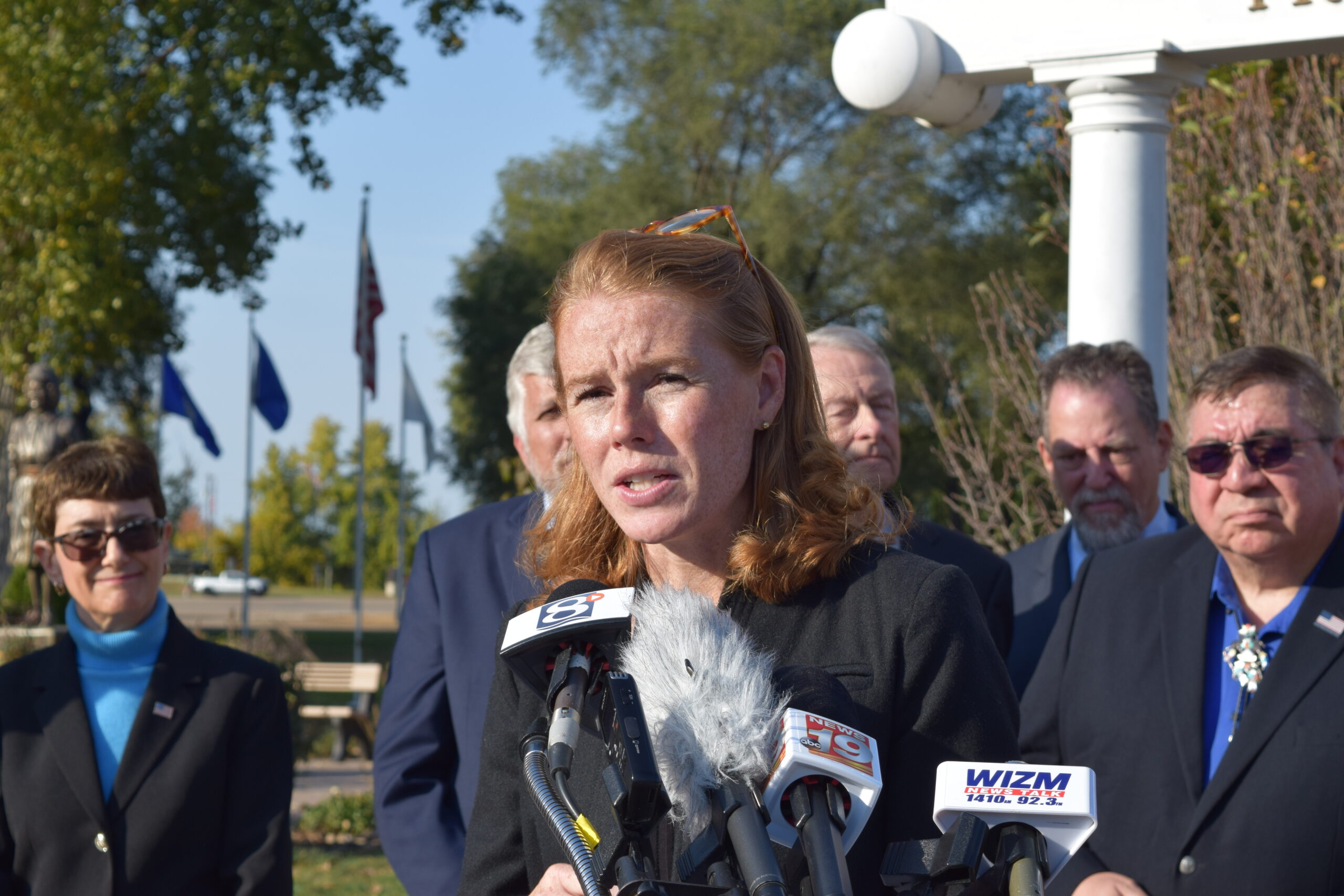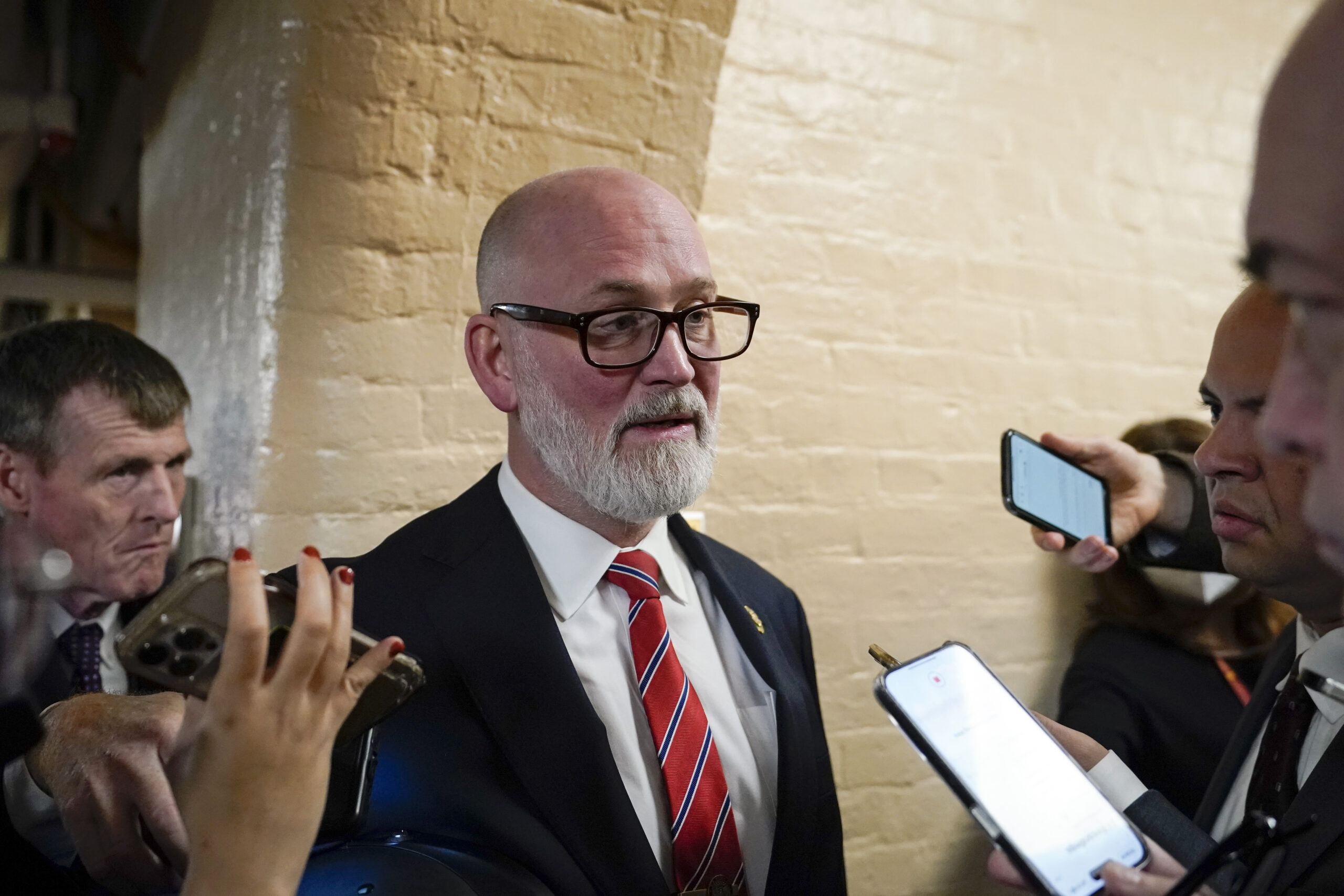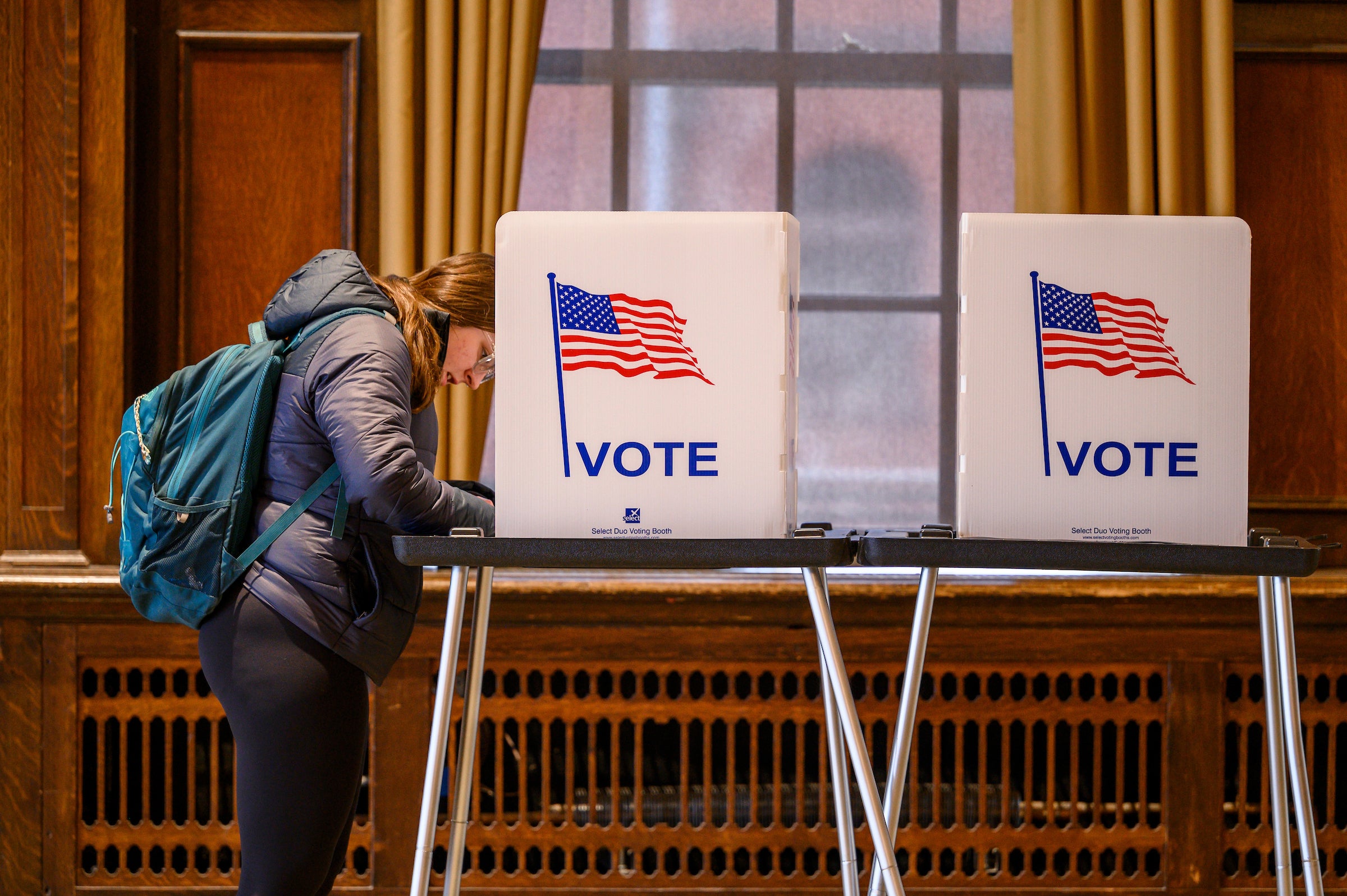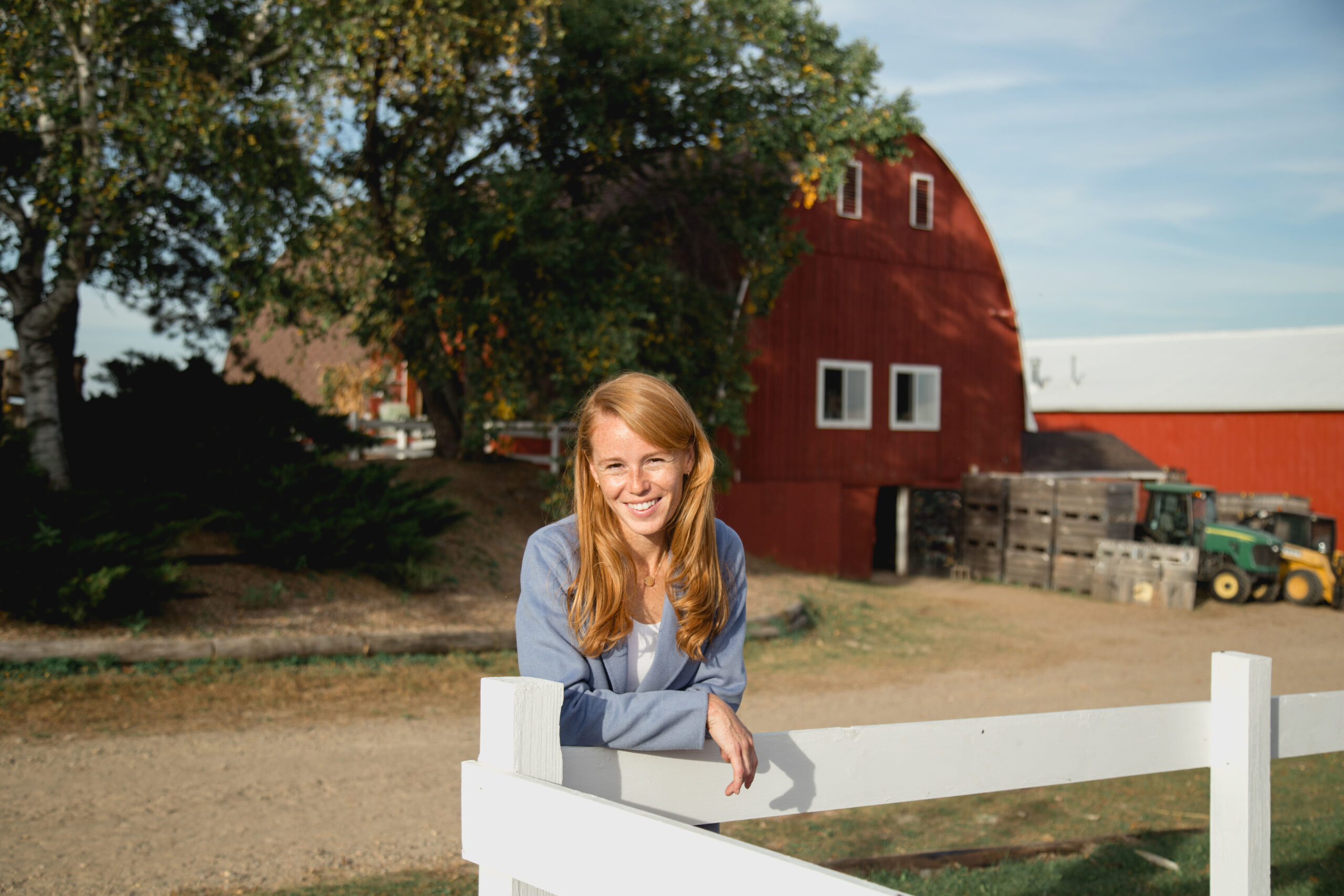Ahead of the Aug. 9 primary, four Democratic candidates are working to win over voters in Wisconsin’s 3rd Congressional District.
On the primary ballot this year are small business owner Rebecca Cooke, retired CIA officer Deb McGrath, La Crosse City Council member Mark Neumann and state Sen. Brad Pfaff, D-Onalaska. The candidates met during a debate at the University of Wisconsin-La Crosse last week in front of members of the press and their campaigns.
The four Democrats each painted themselves as being above partisanship and wanting to represent both the district’s urban and rural communities. They’re competing for a rare open seat. After holding the western and central Wisconsin district for more than two decades, Democratic U.S. Rep. Ron Kind announced last year that he would not seek reelection.
Stay informed on the latest news
Sign up for WPR’s email newsletter.
In a region that has a history of being a swing district, appealing to voters on both sides of the aisle was a strategy that helped Kind hold his seat even when the district voted to support Republicans higher up the ballot like former President Donald Trump.
But each of this year’s Democratic candidates had a unique pitch for winning over Republican voters.
Pfaff highlighted his farming roots and work for the U.S. Department of Agriculture and state Department of Agriculture, Trade and Consumer Protection. He also celebrated the bipartisan support he received in 2020 when he beat out former Republican state Sen. Dan Kapanke, D-La Crosse, for his current office.
“I have stood in dairy barns, cheese plants. I’ve been in diners, I’ve sat at kitchen tables.” Pfaff said. “I’ve heard firsthand what’s happening out here. We need to have someone that’s representing this district in the U.S. House of Representatives that knows this district, that’s been there through time and time again.”
Cooke called on her upbringing on a dairy farm, too, saying she speaks the language of rural Wisconsin. She highlighted her experience as a local business owner, the support she’s received from labor unions in the district and her newness to politics.
“I think we need less career politicians and less political elites representing us in D.C. and more every day folks stepping off the same sidelines to fight for working families,” Cooke said.
McGrath used a more urgent tone when talking about the future of the district, claiming “our democracy is at risk” and highlighting her long career in the U.S. Army, CIA and U.S. State Department. McGrath said she has spent her life fighting for the U.S. and working across the aisle in federal agencies.
“I grew up in a small town here in Wisconsin and the beauty of that is there was calm, not chaos,” McGrath said. “And that’s what people want to return to. That’s what they want in a leader.”
Neumann said he hoped to appeal to the fundamental principles of freedom and fairness held by voters. He said he recognizes that many rural voters feel hurt and want revenge against a political system in Washington that they feel has left them behind.
“I believe that what we need to do is draw forward that hope and say, ‘We can still do it. Let’s do it. Let’s not just get caught in tearing things down, but try one more time,’” he said.
Each of the candidates took a shot at Republican Derrick Van Orden, who is running unopposed in the primary after narrowly losing to Kind in 2020, and candidates criticized his partisan rhetoric and presence at the U.S. Capitol on Jan. 6, 2021. But the debate largely focused on how each candidate would serve voters across the political spectrum on the top issues facing the country.
Future of gun control
Pfaff and Cooke called for similar responses to gun violence in the U.S., supporting universal background checks and red flag laws, which allow a judge to temporarily revoke someone’s right to own a firearm if they find the person is a threat to themselves or others.
McGrath took a slightly different approach, calling for the banning of so-called “ghost” guns, or unregistered guns, and checking buyers for a history of violence. She highlighted her personal experience with carrying a firearm and using it to protect others.
Neumann had the strongest call for gun control measures, saying Congress needs to move past incremental reforms and should start treating gun violence as a public health issue. He called for studying gun violence, putting interventions into place and testing whether they help prevent harm.
Reproductive care after end of Roe v. Wade
McGrath highlighted the fact that she was a mom and described how an unplanned pregnancy caused her to lose her command position in the military. She characterized the overturning of Roe as part of “the radical right-wing agenda” that especially threatens marginalized communities and LGBTQ rights.
Both Cook and Pfaff called for codifying the right to an abortion in federal law, saying the decision should be left to individuals, their families and health care providers.
Neumann again took a more progressive view, calling bodily autonomy a human right and characterizing any attempt by the government to control reproductive care options as an assault.
“It’s more than just the issue of abortion care. It’s our rights to everything about ourselves, the sovereignty of our bodies and the sovereignty of our identities. And for a 3rd party to try to make me into something I’m not, that is an assault. For a third party to tell a woman she doesn’t have the opportunity to care for a pregnancy the way she wants to or to interrupt it, that’s an assault,” he said.
Improving supply chains and addressing inflation
As the owner of a small business in Eau Claire, Cooke said she has experienced pandemic-related supply chain problems first-hand over the last two years. She said Congress needs to work to hold large corporations accountable for how their pursuit of profits has driven inflation and hurt consumers.
Neumann said he would also work to hold corporations accountable, specifically for how just-in-time ordering in the pursuit of profit left supply chains unprepared when COVID-19 rocked the economy.
McGrath said the U.S. needs to work in partnership with other countries to mend disrupted supply chains and improve transportation infrastructure across the country to help goods travel more easily.
Pfaff also called for infrastructure improvements and said Congress needs to help support the reemergence of manufacturing, especially in the 3rd district and throughout the Upper Midwest. He said supporting workforce development initiatives would help the economy recover.
Support for public education and child care
Neumann, who is a retired pediatrician, said he believes support for children’s education should start at infancy, by allowing parents to spend more time at home after birth and supporting universal preschool. He said access to safe and affordable child care is an “issue of justice.”
Cooke, McGrath and Pfaff all called for helping incentivize jobs in K-12 education through programs like tuition reimbursement and by providing financial support to help expand child care.
Pfaff said he would work to ensure schools have equal access to funding “regardless of their zip code” and to tackle the cost of childcare for both families and providers through changes in the tax code.
McGrath called on Congress to fully fund the Individuals with Disabilities Education Act and to codify the Child Tax Credit. She said the cost of child care disproportionately affects marginalized communities.
Cooke voiced support for teachers unions and more mental health resources for students and school staff. She said solutions for childcare availability are not “one size fits all” and that federal funding should work to support efforts that communities have already started.
Wisconsin Public Radio, © Copyright 2025, Board of Regents of the University of Wisconsin System and Wisconsin Educational Communications Board.





